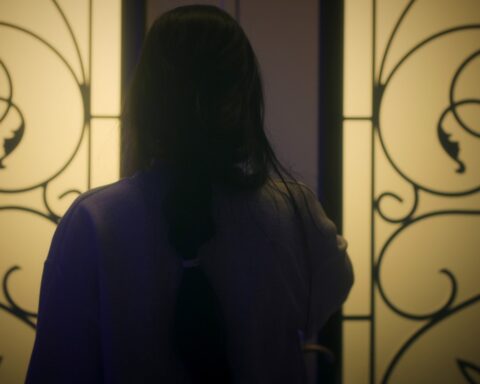In an ingenious bit of programming, Hot Docs has put together three films that deal with women’s choices in completely different cinematic ways.
Linda Heymann’s I Told My Mum I was Going on an RE Trip (UK, 42 min), the centrepiece of the program, shows four actors recount – one via music – the stories of abortion patients in the UK, the doctors who treat them and the counsellors who advise them. Talking to the camera and sometimes to each other, they come across as very authentic, frank and open. This is largely because they are speaking the actual words of women who have told their own stories (originally for a stage production) and because, regardless of what they’re saying – some are pro-life, others seem nonchalant about their choice – they never come across as only good or bad and sometimes change their minds
The dialogue is often fascinating. The titles refers to the outright lie one patient tells her mother. In one effective sequence, two women argue forcefully over whether a fetus is life. In another, a gynaecologist describes how she was in favour of allowing physicians to refuse to do abortions–until she was so inundated by women wanting to terminate their pregnancies that she was doing almost nothing else.
Egg (France/Denmark, 12 min), directed by Martina Scarpelli and beautifully animated in black and white drawings, is a meditation on the director’s experience with anorexia. A woman encased in a box struggles to decide whether to eat an egg, which she fears will have a devastating effect on her body.
Both these movies use cinematic techniques to distance us from the fact that women’s decisions have a profound effect on their health and the quality of their lives. I Told Mum uses dialogue only. We never see the procedures performed: we’re almost never even in a doctor’s office. Though Egg has its terrifying moments, the effect of using animation is also distancing and director Scarpelli actively chooses to make her subject large, not scary skinny.
Paradoxically, director Maria de Mar Rosario’s La Bonita (Cuba/Puerto Rico, 18 min.), which is about everyday treks to the beauty spa, goes in the exact opposite direction. It tracks with excruciating detail the treatments women endure to meet society’s feminine standards. These procedures don’t fall into the life or death category, yet this is the hardest of the three films to look at.
Watch, via intense close-ups, how a woman gets fake nails and see how the blood-soaked tissues accumulate. Notice the bruising that accrues while another goes through permanent make-up applications. Then, watching from above a woman’s splayed legs, learn, if you haven’t yourself had the treatment, exactly how a bikini wax is done. Throughout these procedures the clients are asked, “Does it hurt,” and don’t answer, until the woman getting waxed reacts.
These images are not gratuitous. This is reality and we are asked to sit with pain and wonder how far women will go in pursuit of what they’re made to think is beautiful.
As a whole, the program gives new meaning to the complexities of choice.









